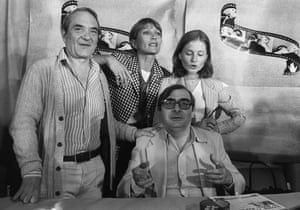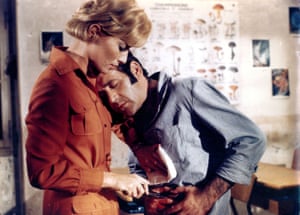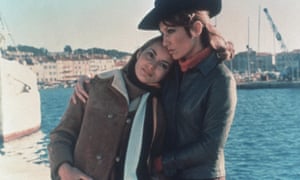 Stéphane Audran, left, in the Oscar-winning Babette’s Feast, 1987. Photograph: Everett Collection/Rex
Stéphane Audran, left, in the Oscar-winning Babette’s Feast, 1987. Photograph: Everett Collection/Rex
Stéphane Audran obituary
Star of Babette’s Feast who shone in the films of her husband Claude Chabrol
"She was one of the icons of French cinema, and pitch perfect in the Hélène cycle: enigmatic and vulnerable. One of those end of an era moments, which gives me the excuse to re-visit her films with Chabrol, starting with the masterpiece: 'Le Boucher'."
Ronald Bergan
Tue 27 Mar 2018
Of all the director-and-star couples in the history of cinema, there was none more prolific than Claude Chabrol and Stéphane Audran, who made 23 films together. Chabrol also directed Audran as Lady Macbeth at a theatre in Versailles, near Paris, in 1964, the year of their marriage. In her husband’s films, Audran, who has died aged 85, perfected her portrayal of the bourgeois Frenchwoman – graceful, aloof, intelligent, reserved and yet passionate. She dominated Chabrol’s films for more than two decades from 1960, often playing adulterous and/or betrayed wives called Hélène.
The “Hélène cycle” – variations on the theme of marital infidelity leading to murder – in which Audran played a wife caught between two characters, usually called Charles and Paul, began with La Femme Infidèle (The Unfaithful Wife, 1969). Chabrol seemed to draw mischievous pleasure from directing his wife in such roles.
Although Audran made dozens of films for other directors, she never shone as brightly as she did in Chabrol’s movies. One exception was as the Frenchwoman who enraptures a group of austere members of a tiny, remote community in 1870s Denmark with her cordon bleu cooking in Gabriel Axel’s Oscar-winning Babette’s Feast (1987).
She was born Colette Suzanne Jeannine Dacheville in Versailles - Stéphane Audran was the stage name she adopted later. Her father, Corneille Dacheville, a doctor, died when she was six. From then until the age of 15, she suffered from renal colic. Her mother, Jeanne (nee Rossi), having lost her first child, was obsessed with Stéphane’s health. She did not approve of her daughter entering the acting profession. Nevertheless, Stéphane studied drama after leaving the Lycée Lamartine.
She made her screen debut opposite the future film director Maurice Pialat in Le Jeu de la Nuit (1957), but it was while filming the role of a hotel manager in Eric Rohmer’s first feature, Le Signe du Lion (The Sign of Leo, 1962), in 1959, that her life changed, when she met Chabrol.
He immediately cast her in his second movie, Les Cousins (1959), in a supporting role. As Françoise, with dyed blonde hair and a revealing, strapless dress, trying to seduce an innocent country boy, Charles (Gérard Blain), at a party, she showed little to suggest a future star. But Chabrol foresaw her potential. At the time, he was married to Agnès Goute. Audran was divorced after a short marriage to the actor Jean-Louis Trintignant, whom she married in 1954 when they were both at drama school.
Audran was further stretched in Chabrol’s early masterpiece Les Bonnes Femmes (1960), as one of four shop girls longing to escape their monotonous existence. Audran, as the sullen beauty Ginette, finds an outlet by singing at a tatty music hall, pretending to be Italian. She then went on to feature in almost every one of Chabrol’s films in the next 20 years, acting as his muse.
The first real inkling of what was to come was her elegant performance in L’Oeil du Malin (The Third Lover, 1962) as Hélène, the French wife of a successful German author, a seemingly happy couple whose lives are disturbed by a voyeuristic journalist. But it was not until Les Biches (1968) that Audran was given a role worthy of her subtle expressiveness, helping her to establish herself as one of the most potent French stars.
The part of Frédérique won her the Best Actress award in Berlin. Audran played a cool and callous rich woman who picks up a young student in Paris and takes her off to her villa in St Tropez, but the local architect (Trintignant) causes a rift in their relationship. The fact that Audran played love scenes with her ex-husband, directed by her present one, gave the witty and caustic bisexual ménage-a-trois an extra frisson.
In La Femme Infidèle, Chabrol applied his sharp scalpel to bourgeois marriage, represented by a respectable husband (Michel Bouquet), complacently happy in his marriage, who discovers that his wife has been having an affair with another man. In order to save the marriage, Hélène is quite prepared to coolly cover up her husband’s murder of her lover.
In La Femme Infidèle, Chabrol applied his sharp scalpel to bourgeois marriage, represented by a respectable husband (Michel Bouquet), complacently happy in his marriage, who discovers that his wife has been having an affair with another man. In order to save the marriage, Hélène is quite prepared to coolly cover up her husband’s murder of her lover.
Juste Avant la Nuit (Just Before Nightfall, 1971) was the reverse of La Femme Infidèle, being centred upon an unfaithful husband, yet in both cases it is the husband who does the killing. He murders his mistress, then confesses to his wife, who doesn’t condemn him. Again, Chabrol’s ironic point is that murder must not be allowed to disturb the surface of middle-class marriage or interrupt elaborate meals.
Audran showed her more emotional side in La Rupture (The Breach, 1970) as an innocent woman fighting to keep her son against the custody demands of her unscrupulous father-in-law (Bouquet). In the same year, in Le Boucher (The Butcher), Audran was extremely sympathetic as a schoolteacher in a small town, who establishes a relationship with the shy local butcher, who turns out to be a murderer.
The blackly humorous Les Noces Rouges (Wedding in Blood, 1973), in which Audran played the wife of a small-town mayor, who has an affair with her husband’s deputy, was the last of the Chabrol films in which she starred as an adulterous ice maiden. Now entering her 40s, she started to be given more supporting roles, such as the lower-class slovenly mother who is poisoned by her daughter (Isabelle Huppert) in Violette Nozière (1978).
After the couple divorced in 1980, and Chabrol remarried, he cast her in four movies – Le Sang des Autres (The Blood of Others, 1984), Cop au Vin (1985), Jours Tranquilles à Clichy (Quiet Days in Clichy, 1990) and Betty (1992). Although they were underwritten parts, it seemed important enough for him to have her there as a reminder of better days.
Audran also appeared in a mix of films, good and bad, by mainly non-auteurs. The exceptions were Luis Buñuel and Sam Fuller. For Buñuel, she was the wealthy society hostess in Le Charme Discret de la Bourgeoisie (The Discreet Charm of the Bourgeoisie, 1972), serenely unfazed by the bizarre events that occur during one night. For Fuller, she played the small role of Doctor Bogdanovich (named as a tribute to the director’s friend Peter Bogdanovich) in the low-budget made-in-Germany thriller Dead Pigeon on Beethoven Street (1972) and she had one powerful scene in The Big Red One (1980) as an underground fighter holed up in a psychiatric hospital.
It was one of several English-language films in which the soignée Audran appeared, though they did nothing to increase her international fame. The Black Bird (1975) was a strained spoof of The Maltese Falcon, with Audran as a Russian with a strong French accent; and she was merely required to wear designer gowns as a rich Iranian in the lame comedy Silver Bears (1978). The lowest point came when playing Jean-Claude Van Damme’s mother in the action movie Maximum Risk (1996).
She was better employed on television as Lord Marchmain’s Italian mistress Cara in two episodes of Brideshead Revisited (1981), and as Georgette in The Sun Also Rises (1984). However, the glory of her non-Chabrol career was her luminous portrayal of the cook-housekeeper in Babette’s Feast, a far cry from the glacial bourgeois persona that was her trademark.
Although she was no stranger to having large meals at home or in a restaurant in her ex-husband’s films, usually orchestrated into the action, this was the first time she was seen to cook any. According to the New York Times: “Her Babette is a portrait filled with poise, great dignity and an illuminating resonance as the solitary artist in exile who finally has the occasion to unveil her talents in the kitchen, to please her public, no matter how uncomprehending they be.”
She is survived by her son, the actor Thomas Chabrol.
• Stéphane Audran (Colette Suzanne Jeannine Dacheville), actor, born 8 November 1932; died 27 March 2018
DE OTROS MUNDOS
RIMBAUD
PESSOA
DANTE
DRAGON









No comments:
Post a Comment